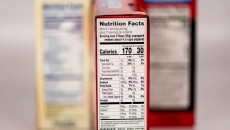Global regulatory cooperation vital in fight against obesity
issues relating to nutrition and obesity unless they work together,
claims a pressure group.
The US-based Centre for Science in the Public Interest (CSPI) argues that governments should urge companies to make nutritional and labelling improvements the standard practice in all countries, rather than just doing the bare minimum to meet local rules.
It argues that regulatory cooperation that spreads food companies' best practices worldwide could help curb a growing epidemic of obesity and diet-related disease.
"Food companies respond to ad hoc laws, regulations, and exhortations from American and European authorities, but tend not to export their nutritional or labelling improvements overseas," said Bruce Silverglade, director of legal affairs for the Centre for Science in the Public Interest (CSPI).
"Some food companies maintain that it's impossible to adopt one practice or another, when in fact, they've already done so in another country."
In a recent study for example, CSPI found that General Mills had reduced the sodium content of Honey Nut Cheerios to 500 milligrams (mg) per 100 grams (g) in the UK, where sodium reduction has been a major priority of the government.
In the US, the same cereal had 700 mg per 100 g, and the company, according to CSPI, has no plans to change.
Similarly, the pressure group claims that Kraft has reduced the salt content of Dairylea Lunchables in the UK by one-third, but has not make corresponding reductions in the US.
Dairylea Lunchables "Ham stack'ems" contains 800 mg of sodium per 100 g in the UK, while the US equivalent product contains 1040 mg of sodium per 100 g.
In some cases, says CSPI, European consumers are losing out on advances made in the United States. Masterfoods' Mars bars for example have full nutrition information in the US, but in Europe, the company lists only a handful of nutrients on labels.
PepsiCo has placed limits on the calorie content of its single-serving Frito-Lay snack products sold in US schools, but has not shown similar restraint with its Walker Crisps line sold in the UK.
"We welcome advances in nutrition on either side of the ocean, but there's no reason food companies can't enact new policies consistently," said Silverglade. "If American and European regulators cooperated and actively pursued a unified strategy against obesity and diet-related disease, companies would take notice."
In 1998, the US and the European Union (EU) agreed to work cooperatively on some trade issues with the formation of the Transatlantic Economic Partnership (TEP). To date, though, the only regulatory cooperation in the nutrition area involves narrow, technical projects, such as developing standardised testing methods for measuring nutrients in food.
According to CSPI, the TEP could be used to help identify and implement best corporate practices on both continents.
Encouraging steps at the international level have been made. The World Health Organization (WHO) for example has developed a global strategy for combating obesity and diet-related disease that includes recommendations on reducing partially hydrogenated oils, added sugars, and salt in processed foods and for curbs on junk-food marketing aimed at kids.
The WHO also says that international collaboration is crucial, since many companies operate globally. CSPI believes that European regulators have been more receptive to these proposals than their American counterparts.
"Regrettably, the Bush Administration has done very little to address obesity, unless you include its initial - and unsuccessful - opposition to the World Health Organization's effort to develop a global anti-obesity strategy," said Silverglade.













